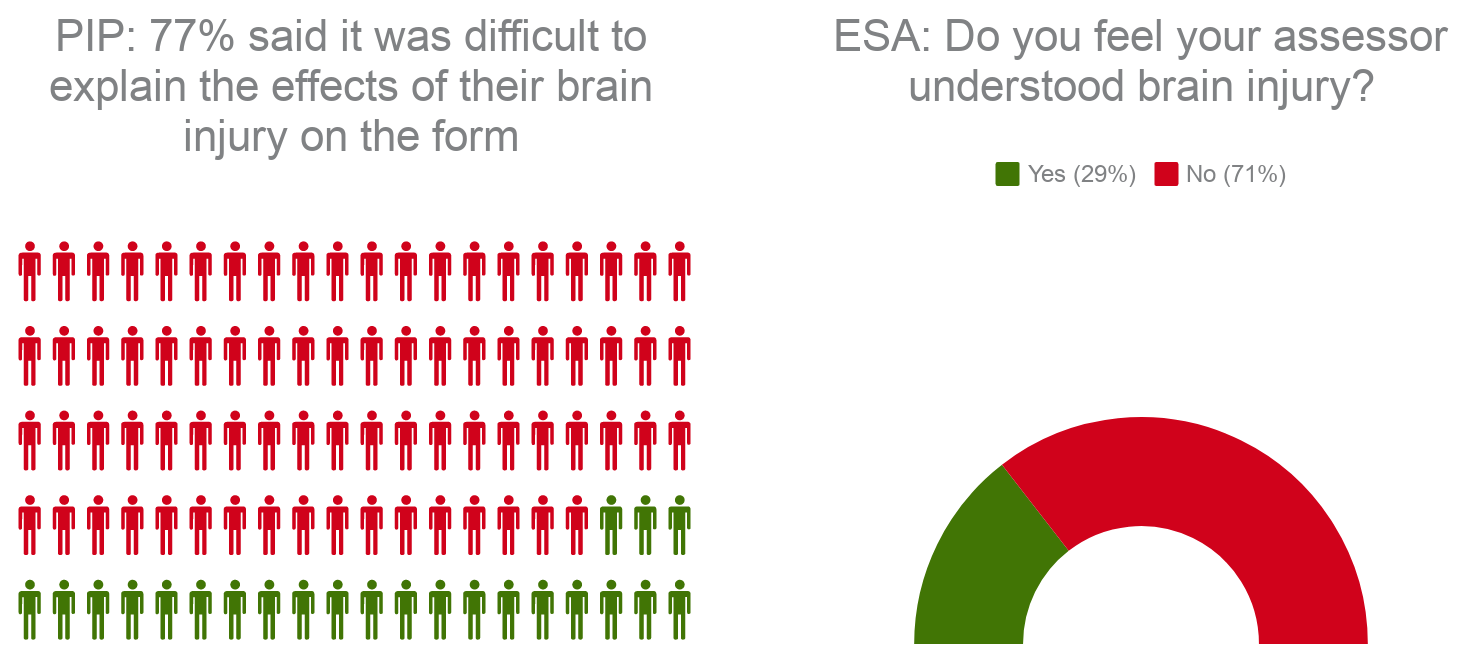Right First Time
 The Right First Time campaign is calling on the government to bring in changes to the disability benefit assessments which currently fail a large number of brain injury survivors and their families.
The Right First Time campaign is calling on the government to bring in changes to the disability benefit assessments which currently fail a large number of brain injury survivors and their families.
The complexities of brain injury, and its often hidden and fluctuating effects can make assessing the impact it can have on survivors’ ability to lead independent lives a complex process.
A significant number of survivors who apply for Employment Support Allowance and the Personal Independent Payment that are refused, are then subsequently accepted on mandatory reconsideration or on appeal.
This can cause serious financial and emotional distress for the survivor and their family as they navigate the various stages of appeal.
In September, the charity submitted a comprehensive response to a Work and Pensions Committee inquiry entitled Are PIP and ESA Assessments working well?
Headway’s evidence was based on a new survey of more than 650 brain injury survivors, which revealed that the experiences many survivors have when applying for these disability benefits is largely negative.

“It took three weeks to fill in the form, the questions were not specific to the challenges to changes in perception, fatigue, confusion.”
- ESA claimant with brain injury
The key findings were:
- The system largely focused on the physical impact of having a disability, neglecting other elements of disabilities.
- 76% and 77% of respondents felt that it was difficult to explain the effects of brain injury on the application form for ESA and PIP, respectively.
- Assessors were found to be lacking in this specialist knowledge. 71% and 60% of respondents felt that the assessor for ESA and PIP, respectively, did not have an understanding of brain injury.
- Assessors were widely reported to lack empathy and patience.
- A significant number of respondents commented on the fact that their medical evidence was not taken into consideration, and that the assessment environment was not suitable for them.
Based on our findings, the Right First Time campaign is calling for:
- Specialist assessors are needed, who have an expert knowledge of complex conditions such as brain injury.
- To build more trust, we need a system for recording and confirming consideration of third-party evidence by assessors and decision makers.
- Applicants should be offered the option for an audio or visual recording of the face-to-face assessment. They should not have to make special arrangements or provide their own recording equipment for this.
Read more about our findings, or download the summary report (DOC) for more details.

Benefits evidence put to parliament
Headway’s comprehensive evidence on the failings of the current assessment processes for vital welfare benefits has been published by an influential parliamentary committee.
Headway’s submission to the Work and Pensions Committee concentrates on three key calls:
- Specialist assessors/decision makers should process claims from people affected by ABI. Alternatively, as a minimum, all assessors/decision makers should undergo specialist training in ABI. This would address concerns around knowledge of hidden disability and increase trust and confidence in the proces.
- Applicants submitting specialist medical or third-party evidence have no means of knowing whether this has been considered, so there should be a system for recording and confirming consideration of evidence by assessors/decision makers.
- Offering audio or visual recording of face-to-face assessments would assist ABI survivors, many of whom have memory problems. Recording would ensure all assessment information to be securely retained by assessors/decision makers. It would also provide robust evidence, if mandatory reconsideration or appeal is required.
Right First Time campaign to be debated in Parliament?
Headway’s Right First Time campaign, calling for disability benefits assessments to be carried out accurately and with understanding of brain injury and hidden disability, could be debated in Parliament.
Speaking in the House of Commons, Dr Lisa Cameron MP, said: “May we have a debate on the inadequacy of PIP and ESA assessments for individuals with brain injury? Research by Headway found that 76% of respondents said it was difficult to explain the effects of brain injury due to the nature of the forms and 71% felt that assessors did not understand their brain injury. We are failing a very vulnerable group.”
Explore the rest of the campaign using the links below:
My story
"The assessment just doesn’t work"
Amanda was left very frustrated and stressed by the process of helping her husband, Alan, apply for the Personal Independent Payment.
Read story








